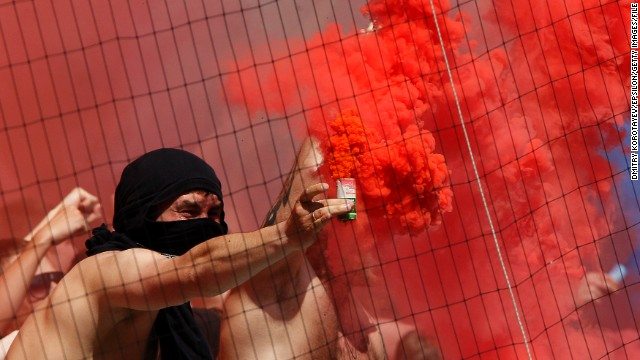Tackling the issue of racism in football
A number of issues have dominated football discussion over the last few years. Issues such as the use of zonal marking, and the growing disgrace of diving. But, by far the most serious, has been the issue of racism. The sickening, divisive and dehumanising action of abuse based on colour, religion, nationality or any other difference in lifestyle or appearance has no place in 21st Century society, let alone in what is essentially a largely insignificant form of entertainment- football.
But it happens. Frequently. The game has several bodies such as ‘Kick it Out’ and ‘Say No to Racism’ that work in conjunction with National Football Associations, UEFA and FIFA to try and stamp out this problem and issue sanctions towards clubs, players and supporters who violate the guidelines laid out for unacceptable behaviour. Fines, match bans for players and forcing clubs to play matches without any fans in the stadium have all been issued as punishment for racist abuse.
But is enough being done? Can enough be done? And are the biggest bodies in football willing to do enough?
Due to racist abuse towards Roma players in their recent 5-1 Champions League defeat, CSKA Moscow have been ordered to play their next three European matches behind closed doors and have been issued a €200,000 fine. This is their third offense of this type in the last 12 months and the punishment appears feeble for what is clearly an ongoing issue that previous sanctions have done little to resolve.
CSKA will take the hit of the three fixtures and will likely be back in the competition next year to start the farce all over again
€200,000 is nothing to a football club, particularly one of the top clubs in Russia like CSKA. Ten times that figure would be negotiated for 30 seconds over a player transfer, and a club may pay a top star that in a week. CSKA will take the hit of the three fixtures and will likely be back in the competition next year to start the farce all over again.
Closer to home, the then Liverpool striker Luis Suarez was given an eight match ban and a £40,000 fine for racially abusing Manchester United defender Patrice Evra in 2011, repeatedly using derogatory language when Evra confronted him. Again, the punishment does not seem to fit the crime for a multi-millionaire. In the return fixture, Suarez refused to shake Evra’s hand in the customary pre-match ritual put in place by none other than ‘Kick it Out’ itself. Many called for the striker never to be allowed to kick a football again, at least on English soil, and who could blame them?
Players have also been known to take the matter into their own hands when receiving abuse from fans. These have ranged from Kevin Prince Boateng leading his Milan side off the field in a mid-season friendly (causing the match to be abandoned) in 2013 to Barcelona defender Dani Alves picking up and eating a banana thrown at him from the stands a year later. The defiant stance of Boateng has yet to be repeated in competitive fixtures, and so has had little impact, while Alves taking it in his stride is also unlikely to solve the issue no matter how commendable it is.
A feeble excuse often put forward by those whose job it is to defend those involved in these incidents claim that it is nothing more than a culture clash. That the use of the ‘N-word’ is not offensive in Suarez’s native Uruguay and that it is more culturally acceptable in Italy, Spain and Eastern Europe for these episodes to occur. CSKA forward Seydou Doumbia even degraded himself by claiming that Ivorian compatriot Yaya Toure was “exaggerating” the abuse he received by fans in Moscow when the Manchester City midfielder issued a complaint to UEFA in 2013.
The fact that these incidents from the last three years can be reeled off while leaving out so many others is unacceptable and is poisoning the ‘Beautiful Game’
One of the main reasons that the governing bodies of football are reluctant to take more severe steps, like removing clubs from its competitions entirely, is due to the disruption it would cause in terms of fixtures. For example, if CSKA were immediately expelled from the Champions League, an issue would arise as the club has already played Roma and Bayern Munich but has yet to play Manchester City; not all parties may be happy to simply void previous games involving the Russian club.
In terms of banning players for lengthier spells or even for life, so much money is invested in buying these players and investing in their image rights that the fall out would more than likely be a financial catastrophe.
But this is bigger than the game. Issues of football and money become trivial when equality and basic Human Rights are repeatedly jeopardised from a handful of sources that show no signs of stopping. We can’t be worried about timetabling, disruptions to competitions or money lost from TV rights. It may be only a few bad apples from an entire orchard that is causing the problem, but that is enough to sour the reputation and turn people away from the world’s most popular and loved sport. The fact that these incidents from the last three years can be reeled off while leaving out so many others is unacceptable and is poisoning the ‘Beautiful Game’.
This cannot continue to happen. Racism is racism no matter what city, country or continent it takes place in. The supposedly “no tolerance” policy needs to be more severe; kick out the people responsible and the problem will die.

Comments